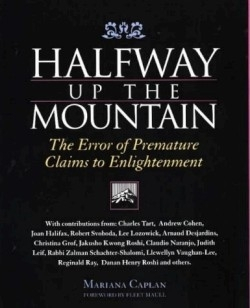Halfway Up the Mountain
The Error of Premature Claims to Enlightenment
With such an elucidating subtitle, the book begins with definitions of enlightenment compiled from various contemporary teachers such as Andrew Cohen, Joan Halifax, Sensei Dana Henry, Jakusho Kwong Roshi, Lee Lozowick, Charles Tart and Christina Grof. Caplan states that Enlightenment is “…the shattering of mental constructs…responsiveness…, a relaxed mind …transitory,…impersonal energy…connectedness…realization you know nothing,” and a great deal more.
The author effectively uses compilation techniques throughout this comprehensive and often critical exploration into contemporary spirituality. She tackles perceived grave distortions and fraudulent claims in the modern spiritual scene. For example, she addresses mistaking the mystical experience for that of enlightenment; ego inflation, power and corrumption among spiritual leaders; and disillusionment on the path. Caplan has written several other works including: When Sons and Daughters Choose Alternative Lifestyles and Untouched: The Need for Genuine Affection in an Impersonal World. Halfway Up the Mountain represents significant research and will take its place on the reference shelves of teachers, religious leaders, students and libraries. It especially, however, belongs in the hands of those who might be prone to thinking that they are spiritually advanced.
The book is divided into five sections: Enlightenment and Mystical Experiences; The Dangers of Mystical Experiences; Corruption and Consequence; Navigating the Mine Field—Preventing Dangers on the Path; and Disillusionment, Humility and the Beginning of Spiritual Life. Caplan explains the need for such a work: “Although the dramatic rise in popularity of contemporary spirituality in the Western world is introducing more people than ever before to spiritual ideas and ideals, the possibility for something other than a superficial affair with God has a very limited value if such ideas and ideals are not understood from a perspective that is educated, deeply considered, and carefully examined and checked.” Her purpose is to raise issues, not to solve them. She leaves that up to the reader or seeker who will find that the raising of the questions may provide protection and aspiration to dive deeper into their own spiritual practices.
The reader may not agree with everything presented, yet still benefit greatly by this intelligently pursued and richly researched work. Each chapter would serve as a fertile discussion topic for spiritual circles. The book includes index, bibliography and endnotes
Reviewed by
Sophia Tarila
Disclosure: This article is not an endorsement, but a review. The publisher of this book provided free copies of the book to have their book reviewed by a professional reviewer. No fee was paid by the publisher for this review. Foreword Reviews only recommends books that we love. Foreword Magazine, Inc. is disclosing this in accordance with the Federal Trade Commission’s 16 CFR, Part 255.

